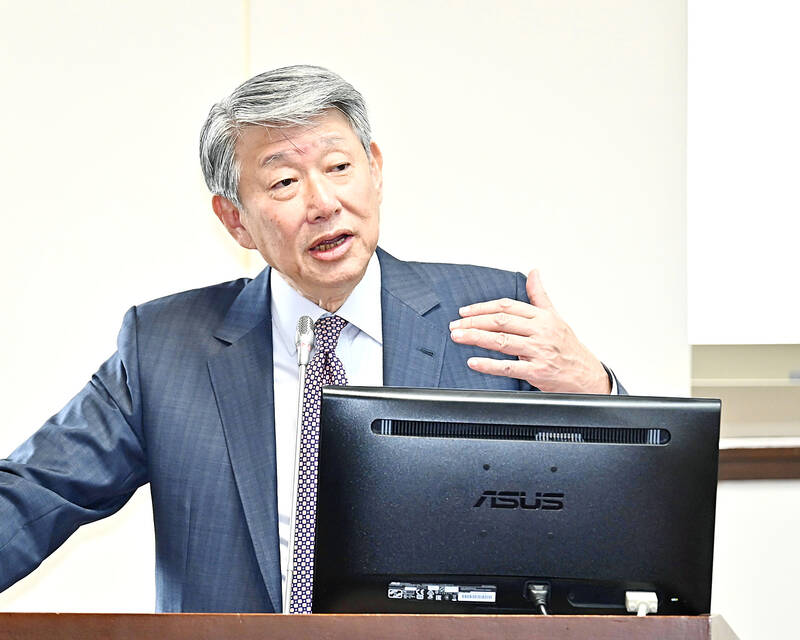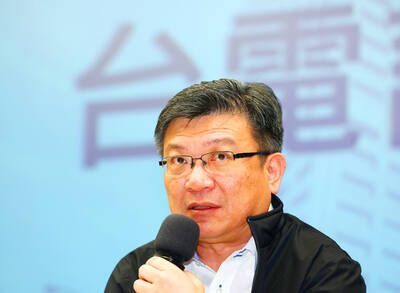International fuel prices are likely to stabilize, as Brent crude oil prices have fallen amid easing tensions in the Middle East, Minister of Economic Affairs J.W. Kuo (郭智輝) said at a meeting of the legislature’s Economics Committee yesterday.
Brent crude fell to US$67.14 a barrel yesterday morning from US$77.01 on Friday, while West Texas Intermediate crude for the August contract stood at US$64.37 a barrel, he said.
The ministry is closely monitoring supplies of crude oil and liquefied natural gas (LNG), he said.

Photo: Tu Chien-jung, Taipei Times
The ministry would coordinate with state-run CPC Corp, Taiwan (台灣中油) to request additional supplies from Australia and the US if an emergency arises, he added.
Kuo’s remarks came after US President Donald Trump on Tuesday announced a ceasefire between Israel and Iran, which diminished prospects of an Iranian blockade of the Strait of Hormuz and reduced risks to energy supplies.
Taiwan imports natural gas from 14 countries, with Qatar accounting for 25 percent of total imports and Australia 38 percent. CPC in March signed a letter of intent with Alaska Gasline Development Corp, expressing an interest to buy LNG and invest in the latter’s Alaska LNG project.
“If crude oil and natural gas shipped from Alaska have advantages in terms of transportation and safety, then we would engage,” Kuo said, adding that the ministry is still waiting for CPC’s final assessment.
Glenfarne Group, one of the primary developers of the Alaska LNG project, is selecting strategic investment partners, and CPC is striving to participate amid competition from other countries, with future involvement depending on its ongoing discussions with Glenfarne, CPC said.
Responding to lawmakers’ concerns about the deadline for the US to implement its broad tariffs on July 9, Kuo said that based on the information gathered so far, the outlook appears positive.
As the US begins to penalize and curb Chinese supply chains, Taiwan’s semiconductor, artificial intelligence and information security sectors are expected to benefit, he said.
Since China’s supply chains are likely to experience spillover effects due to the high tariffs, the ministry would also work to prevent China from exploiting Taiwan through product mislabeling and origin fraud, Kuo said.
The economic outlook for the second half of the year is positive, as key concerns raised by the US during tariff negotiations are being gradually addressed, and GDP growth is expected to stay at about 3 percent this year, he said.

On Tuesday, US President Donald Trump weighed in on a pressing national issue: The rebranding of a restaurant chain. Last week, Cracker Barrel, a Tennessee company whose nationwide locations lean heavily on a cozy, old-timey aesthetic — “rocking chairs on the porch, a warm fire in the hearth, peg games on the table” — announced it was updating its logo. Uncle Herschel, the man who once appeared next to the letters with a barrel, was gone. It sparked ire on the right, with Donald Trump Jr leading a charge against the rebranding: “WTF is wrong with Cracker Barrel?!” Later, Trump Sr weighed

SinoPac Financial Holdings Co (永豐金控) is weighing whether to add a life insurance business to its portfolio, but would tread cautiously after completing three acquisitions in quick succession, president Stanley Chu (朱士廷) said yesterday. “We are carefully considering whether life insurance should play a role in SinoPac’s business map,” Chu told reporters ahead of an earnings conference. “Our priority is to ensure the success of the deals we have already made, even though we are tracking some possible targets.” Local media have reported that Mercuries Life Insurance Co (三商美邦人壽), which is seeking buyers amid financial strains, has invited three financial

BACK IN BLACK: Net losses improved to NT$15.5 billion from NT$60.2 billion, while gross margin returned to positive territory for the first time in four years, it said State-run utility Taiwan Power Co (Taipower, 台電) yesterday said it was “highly possible” the company could turn its financial situation around this year after reporting profits from May on the back of lower fuel costs. The New Taiwan dollar’s appreciation against the US dollar and higher summer electricity rates also boosted the company’s bottom line, Taipower chairman Tseng Wen-sheng (曾文生) said. Electricity rates are about 20 percent higher on average during the summer, while power consumption usually soars 40 percent over other seasons because of higher temperatures, Taipower data showed. Revenue rose 16 percent year-on-year in the first half of this year to

CAUTION: Right now, artificial intelligence runs on faith, not productivity and eventually, the risk of a bubble will emerge,’ TIER economist Gordon Sun said Taiwanese manufacturers turned more optimistic last month, ending a five-month streak of declining sentiment as concerns over US tariffs, currency volatility and China’s overcapacity began to ease, the Taiwan Institute of Economic Research (TIER) said yesterday. The manufacturing business confidence index rose 1.17 points from June to 86.8, its first rebound since February. TIER economist Gordon Sun (孫明德) attributed the uptick to fading trade uncertainties, a steadier New Taiwan dollar and reduced competitive pressure from Chinese producers. Taiwan’s semiconductor industry is unlikely to face significant damage from Washington’s ongoing probe into semiconductors, given the US’ reliance on Taiwanese chips to power artificial